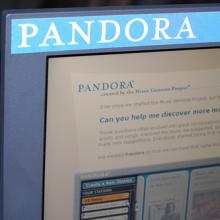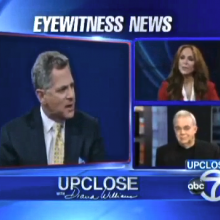hate speech
ISIS terrorist rampages, waves of anti-Muslim hate speech and fear-mongering Islamophobia are inspiring an outburst of online activism in the form of Twitter hashtags.
The question is: Does it work, especially over the long term?
An army of “clicktivists” — a mix of earnest advocates and pointed satirists — has entered the fray armed with 140-character positive, peaceful or humorous counter-messages.
Using names such as #TakeOnHate, #IStandUpBecause, and #NotInMyName, the pushback approach promotes the complexity, diversity and positive contributions of Islam and Muslims. Others, such as #MuslimApologies, offer sarcasm in service of the same message.
Yet the hashtags are often immediately co-opted by trolls spewing an opposite message. And some experts question whether clicktivist campaigns have lasting worth.
Linda Sarsour has no doubt they do. She’s a Brooklyn-based Palestinian activist in the streets and on social media and a co-creator of #TakeOnHate. The hashtag is accompanied by a resource website, launched in March by the National Network for Arab American Communities.
“The insidious thing about anti-Arab hate speech is that it seems to be acceptable, where the ‘N-word’ or anti-Semitic remarks are not taken with the same degree of outrage,” said Sarsour, who was chased down the street in September by a man who was later arrested for threatening to behead her.
Anti-Muslim hate speech on the Internet is commonplace and can motivate some people to commit acts of violence against Muslims, according to a report released Tuesday by Muslim Advocates, a legal and advocacy group in San Francisco.
The report contains examples of hate speech and how it can lead to violence, as well as how victims of online hate speech can report it and counter it. The report aims to help educate parents, students, youth, community leaders, Internet companies, and policymakers on how to counter online hate speech.
FAIR’s recent ad campaigns have attempted to whip up fear and hatred for immigrants by claiming that they will steal jobs from working Americans. This kind of thinking has been debunked numerous times – immigrants contribute to the economy and help start small businesses.
Pandora radio has 70 million users listening 1.31 billion hours each month. That’s a lot of people who were hearing ads based on fear rather than facts.
Along with other groups, Sojourners contacted Pandora and asked them to stop playing these ads. We understand that everyone has the right to say what they want – free speech – but we’re glad that civil society and consumers can put pressure on companies to limit the amount of harmful speech we hear every day.
Pandora has ended the relationship* after reviewing FAIR’s record. Thousands of Sojourners readers signed a petition asking them not to accept hateful ads in the future, and donated to help Sojourners run ads with positive messages highlighting the contributions immigrants make to our communities and their inherent dignity as human beings created in God’s image.
Many will remember pastor Terry Jones as the champion of the “Burn a Quran Day” event, intended to fan anti-Islamic rhetoric on the anniversary of the Sept. 11 attacks. Though many shouted him down and criticized his motives, he continues to have somewhat of a national platform for his agenda.
In this video produced by the New York Times, we get to witness what I consider a momentary intervention of God’s spirit in a beautifully, creatively nonviolent way. As Pastor Jones condemns Muslims and their religion, a man in the crowd pulls up the lyrics to the Beatles song, “All You Need is Love” on his phone. He stands next to jones and begins to sing, inviting the crowd to join in. It is beautiful because his hate is repaid with song, and the sting of his venomous words is neutralized without a hand or another voice being raised in anger (though I could do without the “idiot” sign, thanks).
DOES THE RIGHT to free speech include the right to yell “Fire!” in a crowded social network?
That’s one of the questions raised by the violent overreaction by some Muslims to the 14-minute YouTube video clip, Innocence of Muslims.
Of course, my question paraphrases the words of Supreme Court Justice Oliver Wendell Holmes in deciding that speech likely to cause immediate violence could be restricted. However, over the course of the 20th century, the American standard for limiting potentially harmful speech has gotten a lot tougher. For the past 50 years or so, it’s been settled law in the U.S. that the First Amendment protects speech that is, like Innocence of Muslims, false, hateful, malevolent, and even very badly written, acted, and produced. But the Internet Age is bringing new challenges to America’s free-speech fundamentalism.
Tolerance of blasphemous, racist, and defamatory material is commonplace to most Americans. We take it as one of our God-given rights. But, in fact, this is a real example of American exceptionalism. No other liberal democracy in the world protects speech that is plainly intended to wound and insult members of a specific racial or religious group. “Hate speech” prohibitions are the rule throughout the Western world.
Maybe you've heard the buzz...
On Sunday, Sojourners' CEO Jim Wallis appeared on WABC-TV's Up Close news program in New York City to debate Pamela Geller of the Freedom Defense Initiative and Stop Islamization of America, who put up ads in NYC subway stations that read, "In any war between the civilized man and the savage, support the civilized man. Support Israel. Defeat Jihad."
Like many other folks of good faith, we at Sojourners were horrified by the blatantly hate-filled ads. We decided to do something to counter hate and fear with love and affirmation for our Muslim brothers and sisters. Last week, we began raising funds to purchase our own ad campaign in NYC subways with a simple message: "Love your Muslim neighbors."
Their debate got lively.
See for yourself inside the blog ...
It takes a lot for me to get excited.
Maybe I'm cautious, or maybe I'm just a tough sell, but it takes a big something to get me on board.
Today was that big something.
Last week, Pamela Geller of the Freedom Defense Initiative and Stop Islamization of America, put up ads in New York City subway stations that read, "In any war between the civilized man and the savage, support the civilized man. Support Israel. Defeat Jihad."
Well, I think that's a problem. And Sojourners thinks that's a problem.
Our world is a powder keg, and Geller flagrantly lit a blowtorch with these ads, which, in case you were wondering, are protected fully under the Constitution.
They may be legal, but they're not moral.
“Sticks and stones can break my bones, but words can never hurt me.”
How many of us grew up with this old adage ringing in our ears? How many of us believe it’s true?
I’ve gone back and forth over the years. I understand that the saying is an invitation to turn our backs on harsh, mean-spirited words thus robbing them of their power, but how many of us are really capable of simply doing that? The truth is words do hurt and sometimes they do more than hurt. Sometimes they are downright destructive and on a large scale.
I think this is what the writer of James is getting at in this morning’s text. Words, the works of our tongues, can be used for good and evil. It is not always easy for us to shape our words and move our tongues in a fashion that serves our faith, our calling as Christians, our work for the reign of God on earth.
One important spiritual discipline, one vital element to our faith formation, then, is learning to tame the tongue. That is, we are challenged to develop custody of our speech in such a way that good news is proclaimed and people are lifted up toward the fulfillment of their creation in the image and likeness of God. Remember, James is especially concerned that we align our words and our work so we both “talk the walk” and “walk the talk.”
If we are offspring of the heavenly parent, if we are made in the likeness of God, how should that shape our speech and control the way we wag our tongues?






